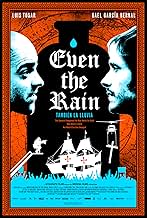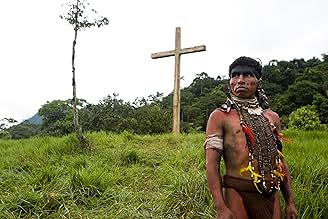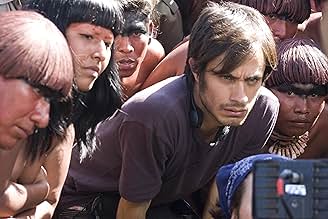IMDb RATING
7.4/10
15K
YOUR RATING
As a director and his crew shoot a controversial film about Christopher Columbus in Cochabamba, Bolivia, local people rise up against plans to privatize the water supply.As a director and his crew shoot a controversial film about Christopher Columbus in Cochabamba, Bolivia, local people rise up against plans to privatize the water supply.As a director and his crew shoot a controversial film about Christopher Columbus in Cochabamba, Bolivia, local people rise up against plans to privatize the water supply.
- Awards
- 22 wins & 17 nominations total
- Director
- Writer
- All cast & crew
- Production, box office & more at IMDbPro
Featured reviews
I really enjoyed the film "Even in the Rain" because the movie had two stories going side by side. It was like a movie inside a movie, which was one thing that I really enjoyed about the movie. Overall the movie was very easy to understand. There might have been one scene that was not that clear to me but I got the general idea of it anyways so it was not really a big problem. If this was an American film the problem would have been solved in the movie, so it different from American films. To my understanding the problem was not resolved in this film. This film taught me how people in other parts of the world are living today and that people do not have the things that we take for granted all time. Also this film sort of taught us about the past which I taught was very interesting. It showed us how the British were treating the Natives. If was the director of this film I would have made it so at the end of the film everyone had water.
"No problem can be solved from the same consciousness that created it" - Albert Einstein
In a film within a film, director Sebastian (Gael Garcia Bernal) and producer Costa (Luis Tosar) are shooting in Cochabamba, Bolivia in the year 2000. The film they are working on proposes to depict Christopher Columbus' exploitation of the indigenous native population in his voyage to the Americas and the effort of two priests to stand up to the Catholic Church. Written by Paul Laverty, the regular screenwriter for British director Ken Loach, and dedicated to the late progressive historian Howard Zinn, Iciar Bollain's openly political drama Even the Rain takes on the past history of exploitation of native populations, showing a parallel to current history.
The film developed through Laverty's desire to dramatize the life of Bartolomé de las Casas, a Dominican friar who becomes an anti-slavery activist in defiance of the church and his native Spain. Shot in the high Andes because of budgetary constraints, Even the Rain attempts to conflate three levels of exploitation: the historical treatment of the Native Americans by the Spanish conquerors in the 16th century, the actual attempt by Bolivia to cede control of the country's water supply to a British-American corporation, and the filmmakers' cost-cutting that results in the Quechua population being paid only $2.00 an hour as extras.
Opening with a "La Dolce Vita" shot of a wooden crucifix being transported to the mountains by helicopter, the film moves to an open casting call in Cochabamba as hundreds of Bolivians line up to audition for a role in the projected film. Turned away by the producer when the quota of locals is filled, Daniel (Juan Carlos Aduviri), a vocal political activist demands that the Bolivians be hired even after they are told to leave. As a result of his strong personality, he is selected to play the role of Hatuey, the first Indian to be crucified for resisting the Spanish and Christian empire.
A problem arises, however, when Daniel becomes the leader of a local group protesting the social injustice entailed in Bolivia's privatization of its own water supply (a true event that forbade the native population from collecting their own rainwater). Even after Daniel tells him "You don't understand, water is life," Costa demands that the young actor give up his political campaign to concentrate on the film which needs him desperately. As the director, Sebastian likewise must walk a thin line between balancing his ideals with his powerful desire to present a revisionist history of Columbus to the world. "The protests will be forgotten, but the film will last forever," he argues.
Tosar is outstanding as the arrogant producer who is drawn unwillingly into the political protest. Overheard on a phone call, Costa brusquely tells a foreign investor how he is putting one over on the locals, not realizing that Daniel, standing only a few feet away from him speaks English. Eventually, however, Costa is forced to choose between the success of the film and the demands of his conscience staring at him relentlessly.
Even the Rain tells us that understanding the past is meaningless unless that knowledge can be made relevant to the present day, a lesson that the characters must learn the hard way. In lesser hands, the film could easily have become didactic or preachy, but Bollain maintains a steady hand and the result is an engaging and powerful film that not only speaks out loudly against injustice, but does so with poetry and passion.
In a film within a film, director Sebastian (Gael Garcia Bernal) and producer Costa (Luis Tosar) are shooting in Cochabamba, Bolivia in the year 2000. The film they are working on proposes to depict Christopher Columbus' exploitation of the indigenous native population in his voyage to the Americas and the effort of two priests to stand up to the Catholic Church. Written by Paul Laverty, the regular screenwriter for British director Ken Loach, and dedicated to the late progressive historian Howard Zinn, Iciar Bollain's openly political drama Even the Rain takes on the past history of exploitation of native populations, showing a parallel to current history.
The film developed through Laverty's desire to dramatize the life of Bartolomé de las Casas, a Dominican friar who becomes an anti-slavery activist in defiance of the church and his native Spain. Shot in the high Andes because of budgetary constraints, Even the Rain attempts to conflate three levels of exploitation: the historical treatment of the Native Americans by the Spanish conquerors in the 16th century, the actual attempt by Bolivia to cede control of the country's water supply to a British-American corporation, and the filmmakers' cost-cutting that results in the Quechua population being paid only $2.00 an hour as extras.
Opening with a "La Dolce Vita" shot of a wooden crucifix being transported to the mountains by helicopter, the film moves to an open casting call in Cochabamba as hundreds of Bolivians line up to audition for a role in the projected film. Turned away by the producer when the quota of locals is filled, Daniel (Juan Carlos Aduviri), a vocal political activist demands that the Bolivians be hired even after they are told to leave. As a result of his strong personality, he is selected to play the role of Hatuey, the first Indian to be crucified for resisting the Spanish and Christian empire.
A problem arises, however, when Daniel becomes the leader of a local group protesting the social injustice entailed in Bolivia's privatization of its own water supply (a true event that forbade the native population from collecting their own rainwater). Even after Daniel tells him "You don't understand, water is life," Costa demands that the young actor give up his political campaign to concentrate on the film which needs him desperately. As the director, Sebastian likewise must walk a thin line between balancing his ideals with his powerful desire to present a revisionist history of Columbus to the world. "The protests will be forgotten, but the film will last forever," he argues.
Tosar is outstanding as the arrogant producer who is drawn unwillingly into the political protest. Overheard on a phone call, Costa brusquely tells a foreign investor how he is putting one over on the locals, not realizing that Daniel, standing only a few feet away from him speaks English. Eventually, however, Costa is forced to choose between the success of the film and the demands of his conscience staring at him relentlessly.
Even the Rain tells us that understanding the past is meaningless unless that knowledge can be made relevant to the present day, a lesson that the characters must learn the hard way. In lesser hands, the film could easily have become didactic or preachy, but Bollain maintains a steady hand and the result is an engaging and powerful film that not only speaks out loudly against injustice, but does so with poetry and passion.
EVEN THE RAIN, directed by Icíar Bollaín, is a compelling film which attempts to explore the history of global economics using a kind of cinematic metaphor. Bollain's film focuses on a multinational movie crew that travels to Bolivia to make a film about Christopher Columbus, and examines his agenda of religious, cultural, and monetary exploitation of The New World. The production company hits a snag when locally violent demonstrations breakout against corporate ownership of indigenous water rights, and threaten to make the completion of the film impossible. The movie shows that the issues of wealth, ownership, and power are just as contentious today as they were five hundred years ago. Corporate giants of our era employ the same greedy strategy in an attempt to steal wealth, power, and access from the uninformed and defenseless. Although the ethical issues in the film are sometimes presented in a slightly heavy-handed manner, by the end of the feature, it is evident that the application of rapacious economic policy hasn't changed much since monarchs ruled the world.
I found it very easy to identify with all of the main players thanks to some great performances from all involved and also a really nicely written script. It's really well shot with nice big, easily legible subtitles (more like this please foreign filmmakers!). It was interesting to see a film set in that region, we don't see very much from that part of the world. There are also some historical facts about the conquistadors that I wasn't aware of and so it even educated be a little! I love the way it slowly dawns on the crew that the mistakes made 500 years previously are still being made today! Over all, I found it well worth a look and it's one I would certainly look at again sometime.
SteelMonster's verdict: RECOMMENDED
My score: 8.3/10
You can find an expanded version of this review on my blog: Thoughts of a SteelMonster.
SteelMonster's verdict: RECOMMENDED
My score: 8.3/10
You can find an expanded version of this review on my blog: Thoughts of a SteelMonster.
Even the Rain (2010)
There are so many stunning, powerful, dramatic, believable moments to this hard hitting film, you wish so much that there weren't a few unreasonable gaffes to the plot and characters. It's frustrating when a film is almost amazing, because you are reminded of what it was not.
But also what it is, which is pretty thrilling and clever.
First, the contemporary setting is based quite closely on the true events of local Bolivians in the third largest city of the country, Cochabamba, fighting for rights to their own water supply. A private (Euro-U.S.) firm has cornered water rights and when the locals try to use their own handmade supply system the police come and interfere. It's maddening to the point of anger on both sides of the screen. In a way, this local uprising against injustice is the movie, the core of the events.
But what makes it actually fabulous is the way it told through the eyes and cameras of a large film crew working on a movie about Christopher Columbus arriving on the shores of America and mistreating the natives. Yes, a parallel that is obvious but handled with dramatic aplomb. There are many moments showing the shooting of the film, and it transports the viewer instantly and beautifully to the Columbus events, which are epic in their own way. But the characters are part professional actors from other countries and part local (and underpaid) extras, some of whom are involved in the water protests when not filming.
So there are several layers of action, tightly interwoven. The disdain and fear of some of the outsiders is believable (the man playing Columbus, Karra Elejalde, is amazing, world weary and tough, taking both sides as needed). Some of the circa 1500 history of resistance by the natives and even the brave defense of the natives by a Spanish priest is inspiring. And the way it still applies 500 years later (500 years!) is depressing. And energizing.
There are some other small problems, maybe the result of editing down too much later, such as the inclusion at the start of black and white video footage, a documentation of the filming, that you think will then become news footage (or not) but then it just disappears as a component of the film, completely, for no reason. And then the tumult of the last half hour with riots and roadblocks is great stuff, really well done, but so highly improbable you have to just write it off to generous screen writing. We aren't really able to believe the wholehearted change of attitude of the producer (played with intensity by Luis Tosar), but it makes for great interpersonal (and sympathetic) dramatics. And finally the director of the movie within the movie is played by the ever beautiful Gael Garcia Bernal, but in fact he's too weak and thoughtful a type to be directing this sprawling and frankly unmanageable movie about Columbus.
But these objections actually only came up for me later, thinking back. While immersed, I was really immersed and impressed. It's an ambitious, smart, and pertinent movie, with great and enjoyable complexity.
There are so many stunning, powerful, dramatic, believable moments to this hard hitting film, you wish so much that there weren't a few unreasonable gaffes to the plot and characters. It's frustrating when a film is almost amazing, because you are reminded of what it was not.
But also what it is, which is pretty thrilling and clever.
First, the contemporary setting is based quite closely on the true events of local Bolivians in the third largest city of the country, Cochabamba, fighting for rights to their own water supply. A private (Euro-U.S.) firm has cornered water rights and when the locals try to use their own handmade supply system the police come and interfere. It's maddening to the point of anger on both sides of the screen. In a way, this local uprising against injustice is the movie, the core of the events.
But what makes it actually fabulous is the way it told through the eyes and cameras of a large film crew working on a movie about Christopher Columbus arriving on the shores of America and mistreating the natives. Yes, a parallel that is obvious but handled with dramatic aplomb. There are many moments showing the shooting of the film, and it transports the viewer instantly and beautifully to the Columbus events, which are epic in their own way. But the characters are part professional actors from other countries and part local (and underpaid) extras, some of whom are involved in the water protests when not filming.
So there are several layers of action, tightly interwoven. The disdain and fear of some of the outsiders is believable (the man playing Columbus, Karra Elejalde, is amazing, world weary and tough, taking both sides as needed). Some of the circa 1500 history of resistance by the natives and even the brave defense of the natives by a Spanish priest is inspiring. And the way it still applies 500 years later (500 years!) is depressing. And energizing.
There are some other small problems, maybe the result of editing down too much later, such as the inclusion at the start of black and white video footage, a documentation of the filming, that you think will then become news footage (or not) but then it just disappears as a component of the film, completely, for no reason. And then the tumult of the last half hour with riots and roadblocks is great stuff, really well done, but so highly improbable you have to just write it off to generous screen writing. We aren't really able to believe the wholehearted change of attitude of the producer (played with intensity by Luis Tosar), but it makes for great interpersonal (and sympathetic) dramatics. And finally the director of the movie within the movie is played by the ever beautiful Gael Garcia Bernal, but in fact he's too weak and thoughtful a type to be directing this sprawling and frankly unmanageable movie about Columbus.
But these objections actually only came up for me later, thinking back. While immersed, I was really immersed and impressed. It's an ambitious, smart, and pertinent movie, with great and enjoyable complexity.
Did you know
- TriviaThe scene where the little girl sees herself on screen was kind of a self homage by director/actress Icíar Bollaín. She wanted to transmit her first impression when she saw herself on screen being a teenager.
- ConnectionsFeatured in Ebert Presents: At the Movies: Episode #1.6 (2011)
- How long is Even the Rain?Powered by Alexa
Details
Box office
- Gross US & Canada
- $518,017
- Opening weekend US & Canada
- $53,730
- Feb 20, 2011
- Gross worldwide
- $7,313,485
- Runtime1 hour 43 minutes
- Color
- Sound mix
- Aspect ratio
- 2.35 : 1
Contribute to this page
Suggest an edit or add missing content






























